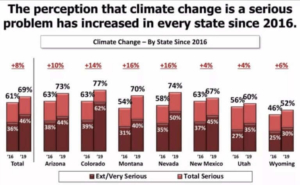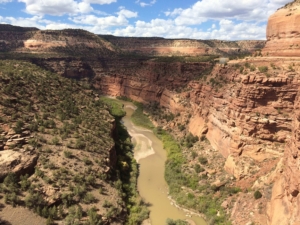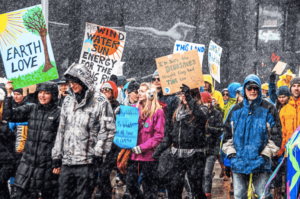For Immediate Release: Thursday, February 28, 2019
Contact:
- Garrett Garner-Wells, Communications Director, Conservation Colorado, 303-605-3483
- Emily Gedeon, Conservation Program Director, Sierra Club, 720-308-6055
DENVER — Today, Governor Jared Polis, House Speaker KC Becker, and Senate Majority Leader Steve Fenberg announced a bill to ensure health, safety and the environment come first in our oil and gas regulatory system.
The bill will:
- Refocus the mission of the Colorado Oil and Gas Conservation Commission (COGCC) to prioritize health safety and the environment over industry profits;
- Empower local governments to have a stronger say by clarifying basic powers such as zoning and noise limitations and allowing local oversight and enforcement of operations;
- Better protect property owners from forced pooling; and,
- Combat the growing problem of orphaned wells by setting forth a rulemaking around financial assurances and bonding requirements for oil and gas permits.
Over the last decade, Colorado’s oil and gas industry has stood in the way of numerous reforms. They blocked efforts to protect health and safety and spent millions on politics and public relations. At the same time, the industry has cut corners on public health and safety, brazenly sited industrial oil and gas operations in residential neighborhoods, and ignored their obligation to develop and maintain a social license to operate. These actions have resulted in a backlog of overdue reforms that this bill seeks to correct.
Conservation groups responded to the bill’s release with the following statements.
“Coloradans have a right to expect that their health and our clean air and water come first — this is Colorado after all. But our current laws governing the oil and gas industry have not kept pace with industrial processes that are ever closer to our neighborhoods, leaving them to bear the consequences. We must reform Colorado’s broken oil and gas system so that our health, safety and environment are not a question but a top priority for state regulators.”
- Kelly Nordini, Executive Director, Conservation Colorado
“The lack of modern, common sense protections from fracking for oil and gas in Colorado has endangered the health of our children, and put our first responders in harm’s way. It’s time for change. It’s time for Colorado’s leaders to put the health and safety of Coloradans before the profits of oil and gas companies.”
- Jim Alexee, Director, Colorado Sierra Club
“As a resident of Battlement Mesa, I have come to understand that the COGCC usually behaves as a partner with the oil and gas industry rather than an advocate for protecting the health and safety of Colorado citizens. Their mission to ‘foster’ oil and gas development leaves citizens at serious risks with little or no recourse when major industrial operations move into our communities. NOW is certainly the time for change at the COGCC!”
- Dave Devanney, member, Western Colorado Alliance
“It is time for leadership, and it is time for meaningful action to put health and safety first when it comes oil and gas. Big oil has become increasingly brazen over the last few years in running roughshod over Colorado communities – forcing massive industrial operations in the midst of homes and schools and forcibly taking the minerals of tens of thousands of private Coloradans. It is time that our legislature act, and put the health, safety, and property rights of our communities first.
- Sara Loflin, Executive Director, League of Oil and Gas Impacted Coloradans

 This shift is drastic. Where did it come from? Its roots may be found in the impacts of the climate crisis unfolding in our communities.
This shift is drastic. Where did it come from? Its roots may be found in the impacts of the climate crisis unfolding in our communities. Colorado just had its second-driest summer on record.
Colorado just had its second-driest summer on record. 


